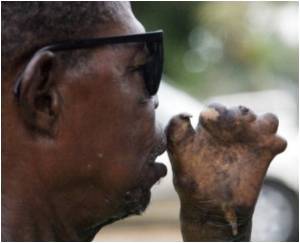
They found the two leprosy bacteria came from a last common ancestor around 10 million years ago.
One piece of evidence is the fact that leprosy is a strict human disease without other hosts or reservoirs. Once outside of the human body, leprosy bacteria are unable to grow in artificial media. One caveat is that Mycobacterium leprae is found in wild armadillos, but only in North America and South America. It's believed the animals likely first acquired the infection from early American explorers a few hundred years ago.
A second piece of evidence suggesting a long history of leprosy lies within the bacterial genome. All worldwide Mycobacterium leprae strains analyzed so far, more than 400 in total, have been found to have essentially identical genomes, or be clonal. This suggests human beings carried the leprosy bacteria when departing Africa around 100,000 years ago to populate the rest of the world.
A third piece of evidence relates to the last common ancestor of the two known leprosy bacteria, which completed reductive evolution around 10 million years ago, resulting in a lean genome and the loss of free-living ability.
Lastly, the oldest age of the leprosy bacteria's pseudogenes suggest that gene inactivation began approximately 20 million years ago. This is likely the point when the ancestor of leprosy bacteria jumped to our early human ancestors and transitioned from free-living to strictly parasitic.
Advertisement
Source-ANI









